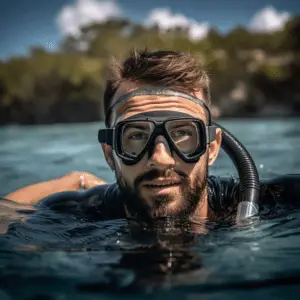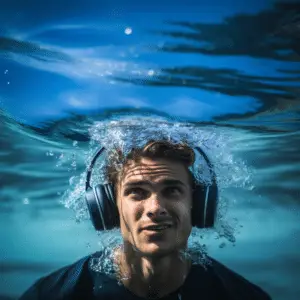Clearing Blocked Ears After Diving: Essential Tips, There are bound to be a long line of questions for anyone who has little experience in diving. Such as: How do you dive? Is diving hard? And how long do oxygen tanks really last? However, one question that people often neglect to ask and later regret is, how do you get rid of blocked ears after diving?
Now we have all had blocked ears at one point or another and I’m sure that we can all agree that having blocked ears is incredibly annoying. Not only does it limit what we can hear, but having blocked ears is also extremely distracting when you are trying to get on with everyday tasks. After all, how can you go about errands when you have water sloshing around in your ear?
Divers know about blocked ears. Strangely, none of the dozens of articles of equipment can prevent water from blocking your ears. Many people wonder why you can’t use earplugs in the water to prevent water from entering your ear canal? Divers should never wear earplugs because they prevent equalization and can damage their eardrums. Earplugs also block your hearing, which is dangerous underwater since someone in your party may require help or an aquatic vehicle may be approaching. Having the capacity to hear is crucial when snorkeling alongside others wearing full-face masks, as you may not see their lips clearly.
So, unfortunately, you have to deal with the inevitable fact that you are going to experience blocked ears when diving, but how exactly do you get rid of it?
Is having blocked ears dangerous?

Aside from being very annoying and inconvenient, there are actually a few dangers that are associated with having blocked ears.
Infection
Blocked ears after diving, Blocking ears for a long time can cause infection. Natural water does not undergo chemical treatment like pools and hot tubs. Sea and lakes are abundant of natural germs that don’t affect humans. Leaving these bacterium in the ear for a long time can cause infection. Any infection in the ears can be quite serious, so get medical treatment immediately if you notice any symptoms.
Eardrum damage
Blocked ears after diving, Water buildup in the ear can cause a lot of unwanted pressure which could lead to the rapture of your eardrum. Obviously, this is the last thing that you want as this can drastically affect your hearing and even lead to permanent damage.
Pain
In addition to damaging your ear, water buildup can be unpleasant and cause pressure, headaches, and other issues. The ear was not designed to hold water, thus water in it is exceedingly painful and impossible to ignore.
Can I avoid having a blocked ear?
Blocked ears after diving, Blocked ears can in fact be avoided if you follow the right steps to do so. The most effective and perhaps the only way to avoid a blocked ear is by equalizing properly. Equalizing creates counter-pressure which could prevent your ear from being flooded with unwanted water and will ensure that you don’t have to deal with any blockages.
There are plenty of ways to successfully equalize, the most popular technique that divers use is the Toynbee maneuver. This technique consists of pinching your nose while swallowing, this creates counter-pressure that combats the increasing pressure of the water that you will experience as you descend deeper into the water.
How to get rid of blocked ears
You won’t be able to deal with your blocked ear issue while in the water, so you will have to wait until you get out to be able to do something.
Lie down
Blocked ears after diving, The first thing you will want to try when attempting to rid yourself of blocked ears is lying down. Now, for a lot of you, I’m sure this sounds like a godsend after spending hours in the water, but it is also really helpful for naturally allowing water to leave your ear.
All you need to do is lie on your side and let gravity do all of the work. The water would have naturally been pushed into your ear due to the pressure of being underwater and once you are away from this pressure, the majority of the water will naturally seep out of your ear. If you struggle to get all of the water out, giving your head a little shake should help with whatever is left.
Use your finger
Though many find it nasty, using your finger to remove water from your ear can be very effective. Wiggle your ear with your finger to let water come out, which usually works. If this doesn’t work, plunge your finger to produce counter pressure to remove the waterfall from your ear canal.
Heat source
People typically use a heater or hairdryer to evaporate ear water. Though not dangerous, long-term heat exposure can damage the skin, so use this approach with caution. Heat has been shown to remove this water. When using a hairdryer, avoid direct contact with your skin and limit heat exposure to 30-second intervals.
Specialized products
Ear congestion has plagued diving since its inception. Many manufacturers have made ointments for blocked ears because of this. Water-blocked ear sufferers commonly have these products in their kit, which may be found at any diving store. Unfortunately, many goods on the market offer to solve your problems but don’t. In a diving firm, you can inquire around about what brand works and where to acquire it.
Alcohol drops
Alcohol drops can be a very good solution for getting rid of blocked ears. You can drop one or two droplets of a dilute alcohol solution into your ear and this will help get rid of any blockages. However, you shouldn’t leave the solution inside your ear for a long time as alcohol can be damaging to the skin and the eardrum.
What should you do if you can’t remove the blockage?

If you have tried several methods and still can’t remove the blockage, consult a doctor. Though a plugged ear won’t kill you, it can cause infection, so prevent it.
A doctor can usually see you promptly and has many instruments to safely and rapidly remove the obstruction. They may also offer future goods and self-removal suggestions if it happens again. They can also monitor for microbial buildup while you’re in the water.
